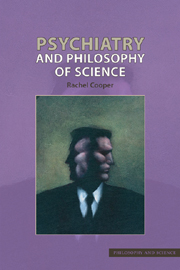Book contents
- Frontmatter
- Contents
- Acknowledgements
- 1 Introduction: psychiatry and philosophy of science
- 2 The nature of mental illness 1: is mental illness a myth?
- 3 The nature of mental illness 2: if mental disorders exist, what are they?
- 4 Explanations in psychiatry 1: natural-history based explanations
- 5 Explanations in psychiatry 2: individual case histories
- 6 Relations between theories 1: when paradigms meet
- 7 Relations between theories 2: reductionisms
- 8 Managing values and interests 1: psychiatry as a value-laden science
- 9 Managing values and interests 2: big business and judging treatments
- 10 Conclusion
- Notes
- Further reading
- Bibliography
- Index
6 - Relations between theories 1: when paradigms meet
- Frontmatter
- Contents
- Acknowledgements
- 1 Introduction: psychiatry and philosophy of science
- 2 The nature of mental illness 1: is mental illness a myth?
- 3 The nature of mental illness 2: if mental disorders exist, what are they?
- 4 Explanations in psychiatry 1: natural-history based explanations
- 5 Explanations in psychiatry 2: individual case histories
- 6 Relations between theories 1: when paradigms meet
- 7 Relations between theories 2: reductionisms
- 8 Managing values and interests 1: psychiatry as a value-laden science
- 9 Managing values and interests 2: big business and judging treatments
- 10 Conclusion
- Notes
- Further reading
- Bibliography
- Index
Summary
Characteristically, within psychiatry there is agreement over little. Instead there tend to be many competing schools and theories. Chapters 6 and 7 examine how distinct schools of thought relate to each other. This chapter looks at what happens when distinct paradigms meet. In particular it considers the extent to which communication between paradigms is possible. Chapter 7 looks at reductionism, and considers when one theory can be reduced to another.
Famously, Kuhn (1970) claimed that scientists normally work within paradigms, and that communication across paradigms is problematic. We shall shortly look at Kuhn's position in greater detail, but in very brief outline Kuhn holds that scientists working in dif erent paradigms see the world in different ways, their theoretical terms have different meanings, and they have different assumptions and values. As a consequence, when they talk to each other, they talk past each other.
Psychiatry is an especially interesting case in considering Kuhn's arguments. In most scientific sub-disciplines all those working on a problem at a time work within the same paradigm. In psychiatry, however, competing groups of scientists adhere to radically different theoretical frameworks. What is more, as many mental health practitioners work in multidisciplinary teams, most mental health professionals have to try to communicate with others who do not share their theoretical commitments on a daily basis.
In this chapter I shall examine whether Kuhn's picture of science can accommodate disciplines like psychiatry.
- Type
- Chapter
- Information
- Psychiatry and Philosophy of Science , pp. 83 - 101Publisher: Acumen PublishingPrint publication year: 2007
- 1
- Cited by



